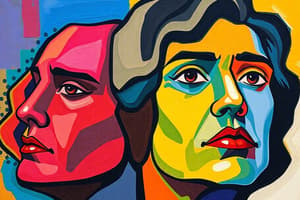Podcast
Questions and Answers
What does the term 'Liberalism' primarily advocate for?
What does the term 'Liberalism' primarily advocate for?
- Strict adherence to traditional values
- Government control and oversight over individual rights
- Development of individual potential and freedom (correct)
- Equality through state intervention
Liberalism supports the concentration of power in the hands of the state in order to ensure welfare.
Liberalism supports the concentration of power in the hands of the state in order to ensure welfare.
False (B)
Who are some of the scholars associated with Classical Liberalism?
Who are some of the scholars associated with Classical Liberalism?
John Locke, Adam Smith, Herbert Spencer
Liberalism is fundamentally linked to the principle of __________.
Liberalism is fundamentally linked to the principle of __________.
Match the following terms with their definitions:
Match the following terms with their definitions:
What is one of the two separate elements that liberalism is composed of?
What is one of the two separate elements that liberalism is composed of?
Contemporary Liberalism aims to secure ideals such as justice, liberty, and equality.
Contemporary Liberalism aims to secure ideals such as justice, liberty, and equality.
Classical Liberalism is another name for __________.
Classical Liberalism is another name for __________.
What term was originally associated with Liberalism before it was referred to as modern individualism?
What term was originally associated with Liberalism before it was referred to as modern individualism?
Liberalism became less influential immediately after the American War of Independence.
Liberalism became less influential immediately after the American War of Independence.
In which century did Liberalism become a guiding ideology for national liberation movements in Asia and Africa?
In which century did Liberalism become a guiding ideology for national liberation movements in Asia and Africa?
Liberalism was influential during the __________ and was a foundation for both the French Revolution and the American War of Independence.
Liberalism was influential during the __________ and was a foundation for both the French Revolution and the American War of Independence.
Match the following historical events with their relevance to Liberalism:
Match the following historical events with their relevance to Liberalism:
Which ideology did India adopt to secure socialist objectives?
Which ideology did India adopt to secure socialist objectives?
Liberalism gained universal acceptance as the most popular ideology by the end of the 20th century.
Liberalism gained universal acceptance as the most popular ideology by the end of the 20th century.
What was the status of Liberalism in England during the 19th century?
What was the status of Liberalism in England during the 19th century?
Flashcards are hidden until you start studying
Study Notes
Liberalism: An Introduction
- Liberalism is a political ideology with a long history, dating back to the origins of the state.
- It has been a consistent and influential ideology, championed by many for its emphasis on individual rights, freedoms, and interests.
- Different periods have offered different interpretations of liberalism:
- Initially termed "individualism."
- Later, "modern individualism" or "new liberalism."
- Currently known as "liberalism" or "contemporary liberalism."
- Liberalism holds significant popularity in the 21st century, gaining prominence in the 18th century during the French and American Revolutions.
- In the 19th century, it continued to influence thinking and policy across various countries.
- In the 20th century, numerous states adopted and practiced liberal ideology, particularly those in Western Europe.
- The ideology also guided national liberation movements in Asia and Africa, seeking to overthrow imperialism and secure independence.
- These liberation movements, fueled by the ideologies of both liberalism and socialism/Marxism, rose to prominence in the first half of the 20th century.
- After World War II, some states embraced liberalism while others opted for socialism.
- India, however, chose a path of "democratic socialism," aiming for socialist goals through a liberal democratic framework.
- During the Cold War (1945-1991), the world witnessed a constant debate between liberalism and socialism/Marxism.
- By the end of the 20th century, liberalism emerged as the most popular and widely accepted ideology.
- It continues to be a dominant global ideology in the present century.
Liberalism: Meaning and Definition
- The term "liberalism" originates from the Latin word "liberalis," meaning "freeman."
- Liberalism champions a social, economic, and political order where individuals can develop fully without undue interference, enjoying freedom and security.
- Liberalism, fundamentally linked to freedom, emphasizes individual development as paramount.
- It promotes progress and improvement in social conditions, believing in the potential of human creativity and rationality.
- Liberalism rejects concentrated power in the state, advocating for a balance between state authority and individual liberties.
- Its core principles include justice, liberty, equality, welfare state, and the development of both individuals and society.
- Liberalism views democracy as authentic only when it operates under its principles.
Classical Liberalism and Modern/Contemporary Liberalism
- Over its history, liberalism has undergone continuous evolution.
- Two major forms emerge: Classical Liberalism and Contemporary Liberalism.
- Classical Liberalism, also known as Individualism, emphasizes limited government based on consent of the governed.
- It finds roots in scholars like John Locke, Adam Smith, and Herbert Spencer.
Studying That Suits You
Use AI to generate personalized quizzes and flashcards to suit your learning preferences.




